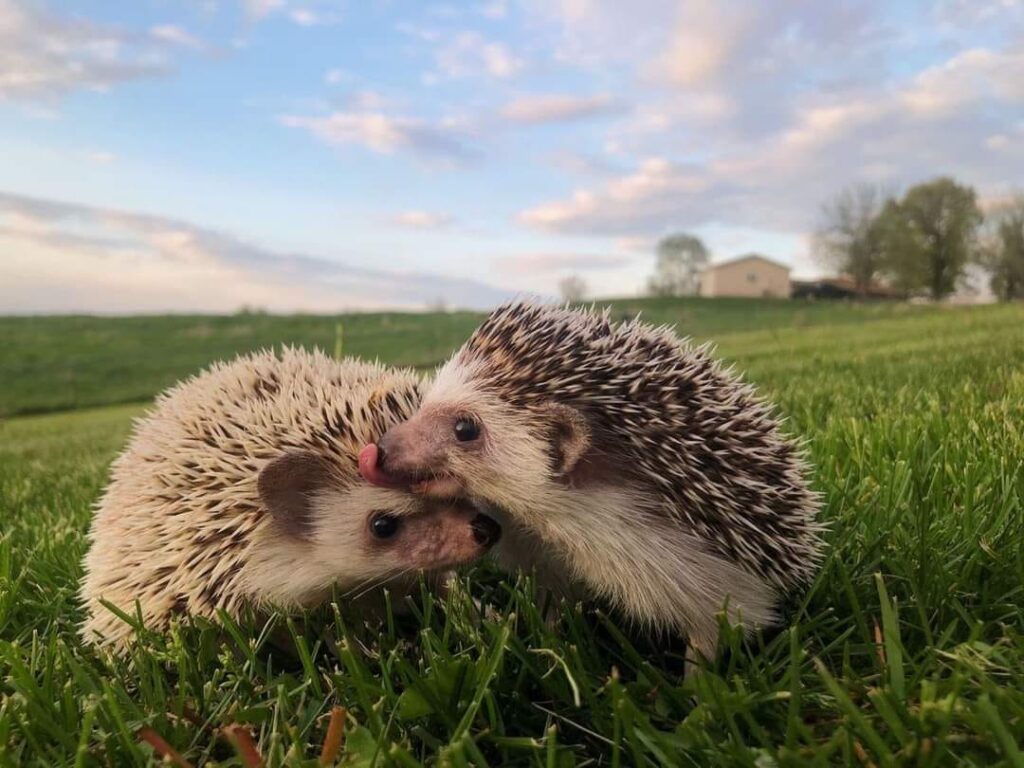Do you want to know more about when Hedgehogs attack?
When my dog died and I was still in sorrow, I got a hedgehog as a pet for a change. I loved having a hedgehog and am considering acquiring another.
I was researching hedgehogs online and came across a lot of concerns concerning assault, biting, and whether hedgehogs are harmful.
I’d like to share the hedgehog attack experience with you, and I’d like you to read How Long Do Hedgehog Pets Live, which will offer you the greatest alternative for giving your pet a long and healthy life.
Let’s go,
What Makes Hedgehogs Aggressive
Hedgehogs are not aggressive pets. They would rather be left alone. Hedgehogs only socialize during mating season.
They do not mate for life. In certain situations, a hedgehog may look aggressive but is only terrified. Here are several hedgehog behaviors to avoid conflating with hostility.
Roll Together To Form A Ball: To defend themselves, hedgehogs wrap up into a ball. In the wild, it is an innate behavior that shields their face and essential organs.
Hedgehogs cannot see well and are easily frightened, they will curl up into a ball at first but then roll out when there is no threat.
This is a gesture of protection rather than aggressiveness for a hedgehog.
Shaking And Spicy: A hedgehog will jump in the direction of the offending thing while looking down with its butt in the air.
It is a defensive position used to counter an attack.
Unless it is afraid of the person in front of it, a hedgehog will not do this.
When a hedgehog is terrified, it is advisable to speak calmly to it and attempt to calm it down before taking it up.
If your hedgehog’s behavior is strange, there might be a reason other than fear, and you should evaluate his health.
Blowing And Hissing: When threatened, hedgehogs hiss and blow. They can attack individuals, but this is a strong indication that they are unhappy and want to be alone. Hedgehogs are not hostile towards humans; they are cautious and watchful.
Do Hedgehogs Attack Humans
Hedgehogs are rarely hostile towards people. Hedgehogs, in most situations, do not assault people and do not seek out problems.
They will sense your presence much before you do. They will utilize loud vocal noises such as hissing and growling to get your attention and scare you away.
When properly socialized and treated with care, hedgehogs are docile and pleasant. It is best to approach hedgehogs cautiously and softly, enabling them to get accustomed to your presence. Avoid startling them with quick movements or loud noises
To ward off possible threats, a hedgehog may curl into a tight ball, elevate its spines, and emit hissing or clicking noises. A hedgehog may bite if it feels particularly threatened. These cases of attack towards people, however, are uncommon.
Can Hedgehog Attack Dog
Hedgehogs are not hostile to dogs and are not likely to assault them. However, if a dog approaches and attempts to socialize with a hedgehog, the hedgehog may feel intimidated and behave defensively. Hedgehogs have spines that may be raised and can curl into a tight ball for safety. If a dog attempts to smell or bite the hedgehog, the spines may prick them, causing discomfort or harm.
It’s crucial to remember that a dog’s attitude to a hedgehog might vary based on temperament and past encounters. Some dogs may be intrigued and wary of hedgehogs, while others may have a prey drive and try to hunt or attack them. Dog owners must keep an eye on their pets to ensure they do not damage or harass animals, particularly hedgehogs.
Do Hedgehogs Attack Each Other
During mating season, hedgehogs attack other males to mark their territory. If you wish to keep more than one hedgehog, they should each have their habitat. They should never be kept in the same cage or enclosure as this will result in fighting.
Female hedgehogs are calmer and will get along nicely with another female in the same cage if appropriately socialized from a young age. It is always advised that each hedgehog has their cage.
When hedgehogs come into contact with one another, they may assert dominance or protect their area by hissing, clicking, or puffing out their spines. These behaviors are often used to establish boundaries and prevent physical conflicts as part of their communication and warning system.
If two hedgehogs are unable to resolve their territorial conflicts by displays and warnings, they may resort to physical combat. This can include biting or slamming each other’s spines.
How Do You Stop Hedgehogs From Attacking Each Other
If you have numerous hedgehogs as pets, keep them apart to avoid potential disputes. Their well-being depends on proper housing, sufficient space, and personalized care. If you notice aggressiveness or injury between your hedgehogs, it is critical that you intervene and, if necessary, seek veterinarian aid.
Here are some things you can do to assist hedgehogs stop attacking each other:
- Divide the Hedgehogs: The first and most obvious step is to divide the Hedgehogs into different enclosures. This will prevent more physical confrontations and allow them time to relax
Make sure each hedgehog has a conducive cage with plenty of space, hiding locations, and resources. This will provide them with a sense of security and limit any territorial conflicts.
- Observe And Identify Potential Triggers: Keep an eye out for events or stimuli that may be causing the hostility. It might be tied to territory, limited resources, or environmental pressures. Identifying the exact triggers might assist you in dealing with the underlying reasons
- Individual Attention And Enrichment: Spend time with each hedgehog, stimulating their minds and bodies. This can include interactive play, toys, and activities that keep children occupied and involved.
- Gradual Reintroduction And Supervised Interactions: If you decide to reintroduce the hedgehogs, do it gradually and carefully. Begin with brief supervised contact in a neutral area, making sure both hedgehogs are calm and show no symptoms of hostility. If any symptoms of aggressiveness reappear, separate them once more and try the reintroduction procedure again later.
- Seek Expert Help: If the aggressiveness between your hedgehogs persists or gets worse despite your efforts, it may be good to talk with an exotic pet physician or a skilled hedgehog breeder. Based on their knowledge, they can give particular counsel and recommendations.
How To Deal With Aggressive Hedgehogs
When dealing with a hedgehog who appears angry and aggressive, follow these steps to calm him down gently:
- Make certain that your hedgehog gets enough sleep.
- If you have a speaker, place it in a room with enough lighting but not excessive noise. Ensure he rests in a comfortable place where he may feel protected.
- Use incentives to entice your hedgehog out of his ball shape or to help him feel more at ease around you.
- Maintain a consistent schedule for interacting with your hedgehog. He needs to spend some time learning to trust you.
- Check your hedgehog frequently for symptoms of illness or suffering, aggressiveness, or behavioral changes that might indicate an underlying health condition.
It is critical for your hedgehog’s health and pleasure that they become used to you. Everybody wants their pets always to be happy It would help if you researched to discover a reliable breeder from whom to get your hedgehog. Breeders recognize the importance of socializing a hedgehog when it is young; it will be simpler to socialize your hedgehog if breeders socialize it appropriately.
Conclusion
Pet hedgehogs are fantastic critters to have. They are not naturally aggressive but cautious and suspicious of unfamiliar settings, odors, and people. With a little patience and intentional effort, your hedgehog will become accustomed to you, and any symptoms of rudeness and antagonism should fade. If you have a pet hedgehog that exhibits unusual hostility, see a veterinarian or an experienced hedgehog owner to rule out any underlying concerns give care, and seek suitable help. For the best ways to enjoy your pet and understand more about its personality kindly read my post How Do I Bond With My Pet

